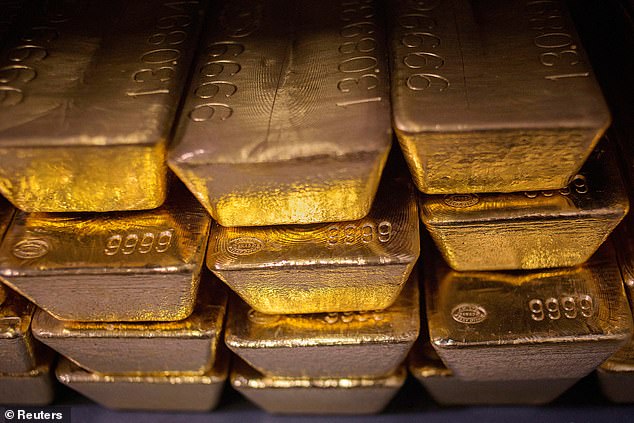Bumper third quarter results and a positive forecast from the world’s largest bank JP Morgan should not be taken as evidence that all is well on Wall Street and global financial markets.
Regulated banks such as JP Morgan, Wells Fargo, Goldman Sachs and Citi, all of which reported yesterday, look to be in good shape with strong capital ratios.
JP Morgan’s charismatic boss Jamie Dimon even felt confident enough to set up a $10billion fund for direct equity investment in vital American industries, such as data centres.
Nevertheless, the International Monetary Fund’s (IMF) financial stability report is a shocker.
It highlights a series of immediate and urgent threats to current overwrought financial markets.
Analysis of asset prices, symbolised by recent incestuous AI deals, points to risk assets valued at ‘well above fundamentals’. The IMF talks of ‘disorderly corrections’ – official speak for a crash.

Record high: Gold prices surged to a fresh all-time high on Monday as investors continue to seek safe havens for their cash
There is also concern about sovereign bond markets with most G7 countries, including the UK, France and the United States, wrestling with outsized budget and debt burdens.
America’s debt interest bill now amounts to more than $1 trillion annually. Most acutely, the IMF’s financial stability chief Tobias Adrian has fears about non-bank providers of private credit.
The shockwaves of the failure of car parts giant First Brands have been felt at UBS and Jefferies.
JP Morgan revealed it had a $1billion exposure to bankrupt sub-prime car lender Tricolor Holdings, describing it as a ‘cockroach’.
Such events demonstrate that connections between banks and private finance could exacerbate adverse shocks.
Ever since the great financial crisis Jamie Dimon and JP Morgan have been there to pick up the pieces.
Despite his own bank’s inherent strengths, Dimon is not entirely confident, telling investors ‘there continues to be a heightened degree of uncertainty stemming from complex geopolitical conditions, tariffs and trade uncertainty, elevated asset prices and the risk of sticky inflation’.
That may well explain why there is a rush of money into the safe haven of precious metals.
Shutdown blues
Bankers, financiers and countless others arriving at Washington’s Dulles Airport for the IMF are in for a shock.
Unless they are fortunate enough to be travelling on a diplomatic passport or by private jet.
Donald Trump’s government shutdown has turned a difficult enough airport to navigate into a nightmare.
Biometric tests for British travellers to the Continent may be causing delays. But travellers to Dulles can expect a delay of at least two hours.
Once in the US capital, the opportunities for cultural enrichment are limited. Smithsonian exhibits such as the National Air and Space Museum and the Museum of African History and Culture are shuttered.
Government workers are going unpaid, although the President’s men have managed to find a way to keep 1.3m active service people on the payroll.
Airports across the nation are struggling, toilets in national parks overflowing.
The Federal Reserve and Wall Street are making investment decisions without the regular diet of economic data which drives interest rates and markets. They are flying even more blind than usual.
Contractors to the federal government, entrepreneurs and businesses dependent on government loans are on life support because access to federal funds is blocked.
Informal talks on keeping basic services running are taking place. But the great Middle East peacekeeper is hunkering down.
He shows no signs of giving into pressure on Capitol Hill to bring government borrowing under control.
Elon Musk may have left Washington in high dudgeon to repair Tesla. His toxic legacy at the misnamed Department for Government Efficiency (DOGE) lives on.
Norman conquest
There are occasions when it makes sense for governance mavens to stretch the rules.
The restoration of M&S’s reputation as the High Street favourite owes much to the nine-year stewardship of Archie Norman as chairman.
There is still much to do, as this year’s cyber scare demonstrated, so extending his term for another three years, with an annual review, makes sense.
It seems to have won the support of big battalion investors. Next stop: a return to £1billion of profits.
DIY INVESTING PLATFORMS

AJ Bell

AJ Bell
Easy investing and ready-made portfolios

Hargreaves Lansdown

Hargreaves Lansdown
Free fund dealing and investment ideas

interactive investor

interactive investor
Flat-fee investing from £4.99 per month

InvestEngine

InvestEngine
Account and trading fee-free ETF investing
Trading 212
Trading 212
Free share dealing and no account fee
Affiliate links: If you take out a product This is Money may earn a commission. These deals are chosen by our editorial team, as we think they are worth highlighting. This does not affect our editorial independence.
This article was originally published by a www.dailymail.co.uk . Read the Original article here. .

